Prime Minister Narendra Modi on Tuesday said India and Bangladesh should jointly face terrorist and fundamentalist forces that threaten to attack mutual trust between the two countries.
Modi made these remarks after bilateral talks with visiting Bangladesh Prime Minister Sheikh Hasina, who made a strong pitch for early conclusion of the Teesta water sharing agreement.
"Today we also stressed on cooperation against terrorism and fundamentalism. To keep the spirit of 1971 alive, it is also very necessary that we face such forces together, who want to attack our mutual trust," he said.
The two sides also signed seven agreements covering diverse areas such as railways, space technology, water sharing, connectivity.
Briefing on the visit, Foreign Secretary Vinay Kwatra termed counter-terrorism and radicalisation as an "obstacle and security threat" to India-Bangladesh relationship.
He said the two leaders held comprehensive talks on how to improve cooperation on the issue.
India and Bangladesh signed an interim water sharing agreement on the Kushiyara river, which would benefit people of southern Assam and the Sylhet division of Bangladesh. This was the first water sharing agreement signed by the two countries since the Ganga water treaty in 1996.
Hasina also flagged concerns over the delay in clinching the Teesta water sharing agreement which has been hanging fire since 2011, when West Bengal Chief Minister Mamata Banerjee objected to it.
Modi also said India and Bangladesh will soon start discussion on the Comprehensive Economic Partnership Agreement (CEPA).
Kwatra said the CEPA agreement is expected to be reached before Bangladesh graduates from the category of Least Developed Countries by 2026 and moves to the ranks of developing countries.
On the increasing Chinese presence in Bangladesh, he said the two leaders had a very comprehensive discussion on the issue.
"The discussions between the two leaders have been comprehensive. In this context there is a clear common understanding that the strategic priorities of the relationship of the two countries, interests and concerns of India, and interests and priorities of Bangladesh are all factored in our cooperative matrix of engagement," the foreign secretary said.
"Our relationship stands on its own merits, focuses on its own priorities, and looks at our shared concerns, whether they are related to safety issues or security issues," he said.
Hasina also sought assurances from India on supply of perishable commodities and reviewed the Friendship pipeline that will supply high speed diesel to north Bangladesh.
Earlier, Hasina was accorded a ceremonial reception at the forecourt of the Rashtrapati Bhawan. The visiting dignitary also offered floral tributes at Rajghat, the memorial to Mahatma Gandhi.
Hasina also called on President Droupadi Murmu and Vice President Jagdeep Dhankar.











